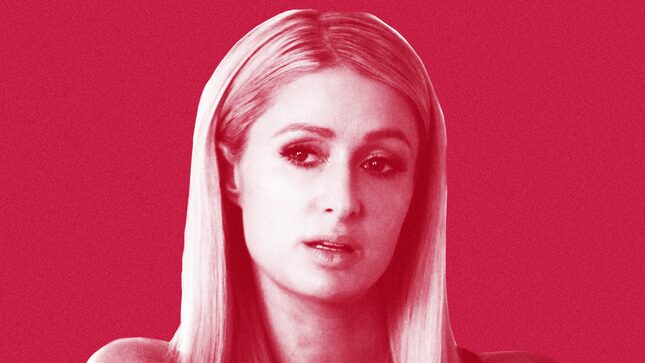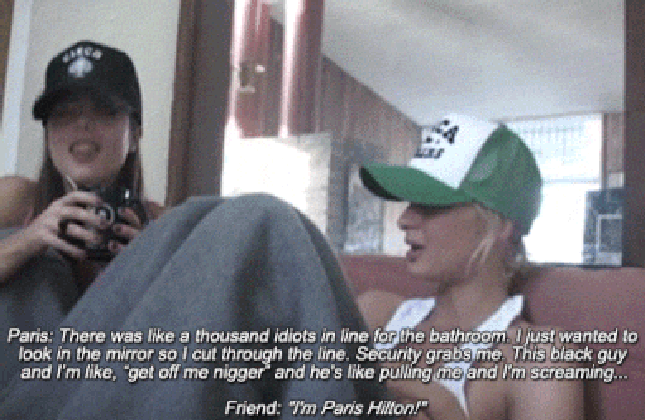The Revision of Paris Hilton’s Story Is Missing Something: Her History With the N-Word
This Is Paris is the latest attempt to revise the legend of Paris Hilton.
EntertainmentMovies
Graphic: Elena Scotti (Screenshot via YouTube)
Alexandra Dean’s documentary This Is Paris is the latest attempt to revise the legend of Paris Hilton, this time from a particularly sobering angle. Much of the coverage of the movie, which debuted last week on YouTube, has focused on the abuse and subsequent trauma suffered by its socialite/businesswoman subject Paris Hilton at the Provo Canyon boarding school in Utah during her teens. This is previously undisclosed information that the documentary teases out over much of its 105-minute running time. At various points, she describes being pulled out of her bed and recounts being fed pills without knowing their exact medicinal contents. And then during the movie’s last moments, we see her contribution to an anti-abuse campaign: a snapshot of her holding a poster detailing her trauma and claiming she was verbally, emotionally, and physically abused.
Hilton’s allegations are serious and credible, and the documentary gives space to other survivors of Provo Canyon’s misdoing. The allegations, though, can be both true and not the whole story, both revelatory and handled imperfectly by the filmmaker. This Is Paris’s new information—Hilton’s abuse and subsequent trauma—is treated more as a framing device than a display of catharsis. It is a way of shading in its subject’s biography and of earning its keep. It insists there is more to Hilton than the vapid, entitled blonde character she says she devised for The Simple Life, the reality show that helped shoot the heiress to fame and ceased airing 13 years ago. In the ensuing time, Hilton has had innumerable opportunities to course-correct—including other reality series—but she insists in This Is Paris, in footage shot in 2019, “No one really knows who I am.”
This is Paris: Someone who has suffered, despite what you may have been led to believe, even if it was by its very subject. Dean told Refinery 29 that she believed that Hilton’s initial reasons for participating in the doc were—you guessed it—for her image (“She felt her reputation was kind of lagging behind this reality, which is that she’s a really successful businesswoman and also the number one female DJ in the world”), but that in the process of revealing came to believe that she could help other survivors of boarding-school abuse and, by doing so, stop the nightmares that were plaguing her.
Hilton has claimed altruistic intentions in the doc’s press cycle, and also the image-enhancing potential at hand: “I think it’s just shows that there’s so much more to me. So many people are used to seeing the glitter and the unicorns and the sparkles and the Barbie of it all,” she told Variety. “But when it comes down to it, there’s so much more to that than the girl you see on the red carpets or behind the DJ booth. There’s actually a real human.”
If, after spending two decades as a public figure whose job has often consisted of showing up and existing, Paris Hilton is still misunderstood and dismissed for being a caricature, much of the confusion is her own misleading. Dean, though, seems uninterested in confronting Hilton with the bed she’s made, and instead focuses on the discomfort of lying in it.
The m.o. of This Is Paris is reappraisal—“She let me do this film as a way of kind of answer[ing] the question, ‘Could we so misunderstand a woman today the way we did with Hedy Lamarr?,’” Dean told The Wrap, referring to the Hollywood royalty who was the subject of her previous documentary.The revisionist goal is especially apparent in the discussion of Hilton’s so-called “sex tape,” which was released in 2004 without her consent. Hilton says the experience was “like being electronically raped,” and recounts the humiliation she felt when the media made her a punchline in response, effectively blaming her for her sex life. “If it were today, that wouldn’t be the story at all, but they made me the bad person, like I did something bad,” she says. Indeed, if it were today, plenty of people would be calling that footage what it actually was: revenge porn.
But the nearly two-hour-long process of reassessing Hilton’s legacy, made me think about how another leaked tape of Hilton’s would be received if it were leaked today. This one, I think, would be judged more harshly and instead of inviting sympathy would almost certainly provoke mass disdain or “cancellation” as the ultra-concerned call it. It depicts Hilton saying the n-word—hard-R, derogatory cultural associations and all. It circulated widely when it leaked in 2007, was discussed in mainstream venues like The View and CNN, and its existence did absolutely nothing to impede Hilton’s career. It seems to be less than an afterthought today.
-

-

-

-

-

-

-

-

-

-

-

-

-

-

-

-

-

-

-

-

-

-

-

-

-

-

-

-

-

-

-

-

-

-

-

-

-

-

-

-









































